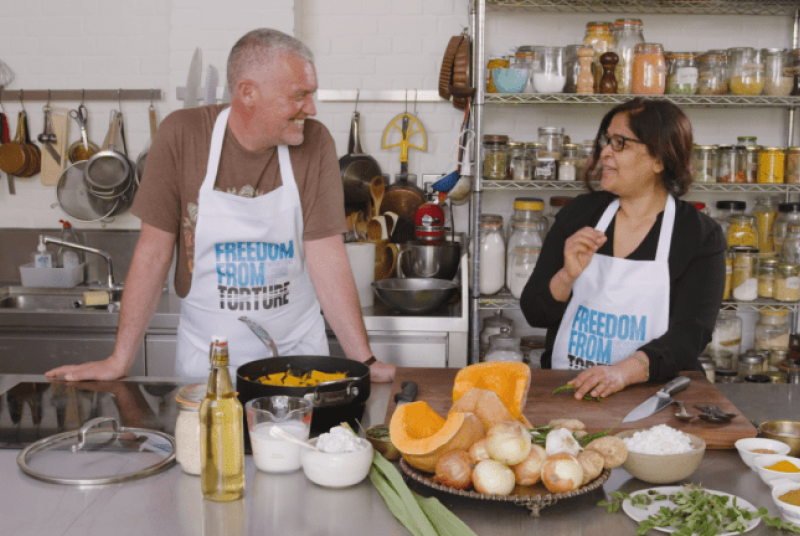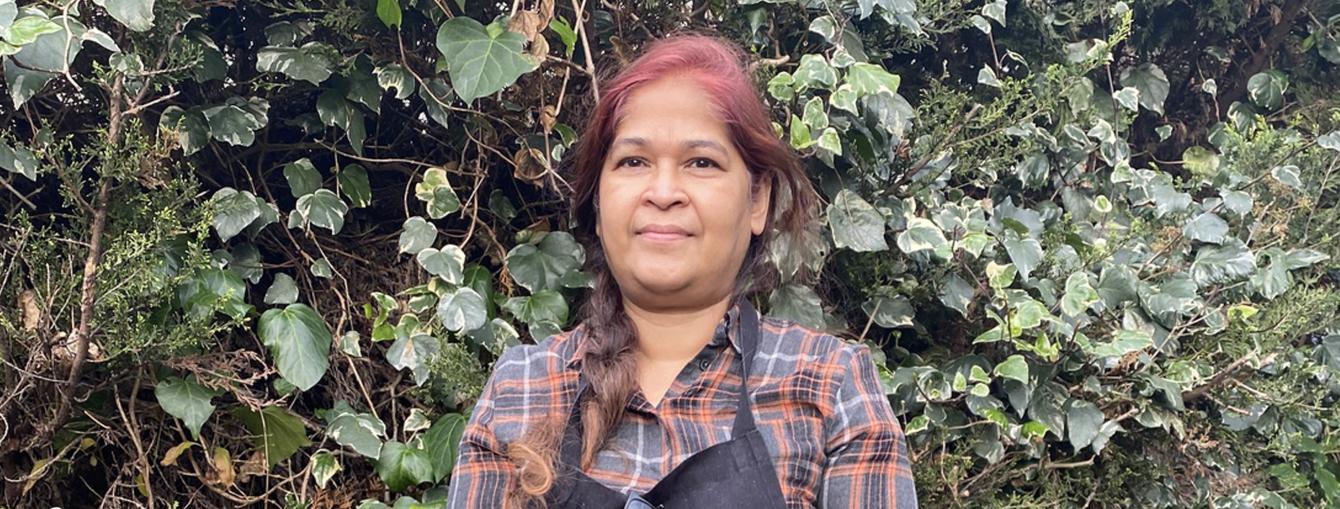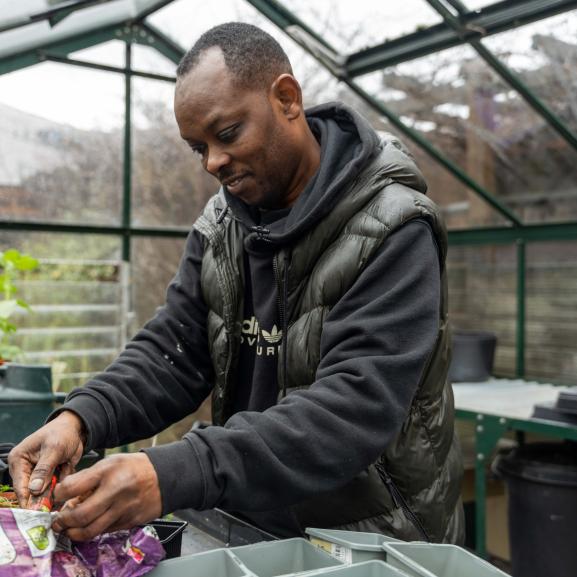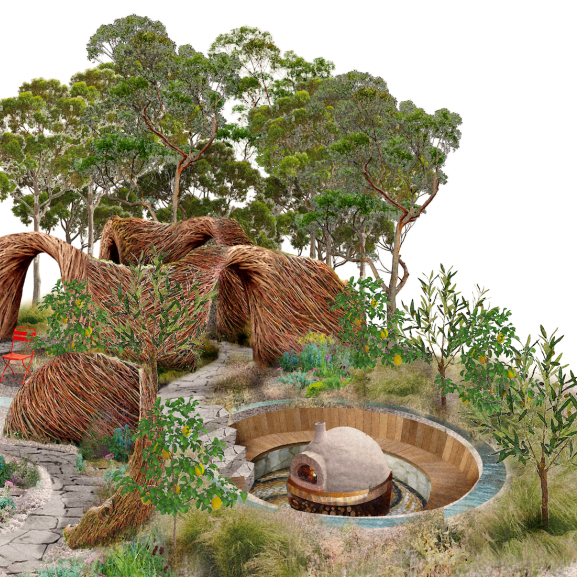How baking bread helped me find my voice - Nafa's story
Through the Freedom from Torture bread group, Nafa, a torture survivor, was able to find her voice again. Since then, she's made great strides as a chef. This is her story.
I don’t remember arriving in the UK.
I came to this country at the age of 46 in 2013 – accompanied by my 16-year-old son – after fleeing torture and persecution in Sri Lanka. Memory loss, I now understand, is a common reaction to trauma. To this day, much of my life remains a blur to me – and I have trouble speaking to people too.
War, and the torture I suffered before I fled the country, tore that life away from me. But now, years later, cooking food from Sri Lanka has helped me reconnect with the life I lost. My first months in London were among the most difficult I have experienced. Unable to speak the language and plagued by the horrors of my past, I could not properly look after myself.
I was terrified of strangers and found myself unable to speak to anyone. I did not know who to ask for help.
Back home, I used to sell shoes and handbags to the women in my town. But within months of arriving in the UK, I was wearing plastic bags over my socks to stop the rainwater seeping through the holes in my shoes.
As I had no money, I would often attend a Tamil temple near where I was staying in Ilford, which would provide me with a hot meal. A Tamil doctor who also attended the temple noticed me sitting silently in the corner, avoiding eye contact with anyone, and recognised that I was showing symptoms of trauma – common among torture survivors.
She took pity on me and took me to stay at her home in Essex. She and her husband helped me complete my asylum application and secure accommodation at a hostel in South London.
From there, I was referred to Freedom from Torture. All I remember from my therapy session is the bright purple wall of Freedom from Torture’s London centre near Finsbury Park, in the north of the city. It is specially designed with curved corridors without corners, so as not to evoke memories of prison corridors in the survivors who are treated there.
As I got to know my therapist, Elena, I started to rebuild my sense of self. For the first time, I felt I had found someone who understood what I was going through. The organisation looked after me, providing me with winter clothes and a new pair of shoes. Now when I see that purple wall, I feel safe and calm.
After four years of therapy, I had made great strides in my recovery, but I still struggled to talk to anyone unless I knew them. Even simple things like asking for directions were impossible for me; when I would try to speak to strangers, my hands would shake and my voice would catch in my throat.
To help me start talking again, my therapist encouraged me to join Freedom from Torture’s baking group and bake bread with fellow survivors.
When I first started attending, I stood in the corner and wouldn’t speak to anyone. But as we had to share equipment and ingredients, I eventually found the courage to make small requests of my colleagues.
I’d be able to ask things like ‘Can you pass the butter?’ or ‘how much flour do I need?’ Bit by bit, I began to find my voice again.

As my confidence in baking grew, an extraordinary thing happened. Memories of my old life began to emerge out of the fog of my past.
I remembered my mother making curry powder from a jealously guarded recipe, full of rare and secret ingredients. I remembered the smell of the hemp seed she would grind to make her special beef stew. I remembered my father’s restaurant, where people from the neighbourhood would queue to grab a bite to eat. It was then I decided I wanted to be a chef.
After I excelled at baking, the leader of the bread group, Kirsten, recommended me to a hotel school that specialises in training refugees and others facing disadvantages finding employment. I felt so proud that my talent and hard work were being recognised.
During my training course, I worked in the kitchens at two famous five-star hotels in central London – The Goring in Victoria and the London Edition in Marylebone. While I still struggled to speak to strangers, I worked hard at every task I was given and relished the opportunity to learn a new style of cuisine.
I passed my training course and now work a few days a week preparing food at a North London café with my son.
One day when I was at the baking group, the famous chef Paul Merrett came in to demonstrate some pastry techniques. At first, I was very shy, but after repeated visits by him over the years, I got to know him better and we have become firm friends.
Last year, Paul asked me if I would join him in hosting some online cooking classes and show him how to cook a traditional Sri Lankan pumpkin curry.
I was terrified at the thought of being in front of a camera and spent the night before practising, with my son holding a pillow in place of a camera. But once I started cooking, I felt calm and relaxed, as if the camera wasn’t there. I am very proud of the video; it’s nice to be able to show my son my work.
In 2022, Paul asked me to take on an even bigger challenge; cooking alongside top chefs in front of hundreds of people at ‘The Great Street Feast’, a charity food festival held by Freedom from Torture in June each year.
Proceeds from the event will be used to provide therapy for other survivors like me. I will be showcasing some Sri Lankan cuisine and selling some of my homemade curry powders.
If you had told me nine years ago that I would be cooking alongside chefs from restaurants like Ottolenghi and Iberica, I would have thought you were joking. But when I cook, all my fears and worries melt away. I feel like there is nothing I cannot do.






